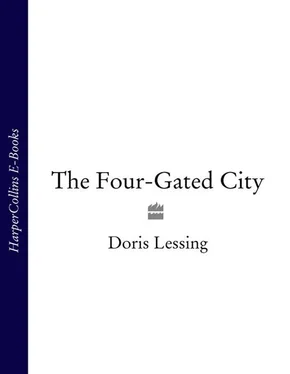He was still talking in terms of a situation normal enough to blow over. He could not bear to see that a deep harm had been done; and that they, or at least, he, must expect the results of it, and that the results were for life.
But how could Martha blame Mark when she caught herself thinking several times a day: Before Sally killed herself, before Colin went away – the double event which her nerves, geared to laziness, still felt as a water-shed. And it was as much her fault as Mark’s that Paul had not been told the truth (as much truth as could be told to a child of six) so that now he trusted no one; it was as much her fault that the affair had been handled so that the truth had come through journalists scavenging for news.
And what was the use of feeling guilt, blaming herself and Mark, when they still did not know how to act, still sat night after night in the quiet book-lined study, with a decanter of old brandy on the desk, and when they did act, absurdity or worse came of it. For they had lost a sense of the ordinary machinery of life.
One afternoon they had watched through the windows a couple of Press men rummaging through their dustbins in search of incriminating documents.
One of them was Miles Tangin. Mark telephoned the editor to protest, could not get through, left a message that he would like to be rung back, was rung back by – Miles Tangin. The telephone number then had to be changed again.
Martha suggested that he should ask the police to guard front and back entrance, to keep the journalists off.
Mark was furious. ‘I’m not being guarded by police in my own house in my own country because of a lot of … I’ll get Margaret to tell the editor what’s going on. She must know him.’
He rang his mother’s home in the country. It was only when it had been ringing for some minutes that they realized it was after two in the morning. After a long wait, John came to the telephone. He was polite of course. Mark spoke to the colourless husband of his mother, a man whom he despised, though of course, he had never been anything less than polite to him. Martha sat on an old brown sofa, feeling velvet rub soft under her fingers. She was watching Mark clutch the telephone as if the machine itself could come up with sense, or protection. In the last couple of weeks he had lost over a stone. His clothes were hanging on him. His fingers were stained with nicotine to the knuckles. He looked half crazy.
John said that Margaret was asleep after a hard day. The Press had been out to the house, and the telephone was never silent.
‘I want to speak to her,’ said Mark.
‘I’ll tell her in the morning that you rang.’
‘Then tell her to get hold of those editors and call off their dogs,’ said Mark.
A short affronted laugh.
‘Perhaps if you were prepared to make some sort of announcement to the Press? suggested Margaret’s husband.
‘What announcement would you suggest?’
Another short laugh. ‘As things stand, your mother, my wife, is the mother of a man who has escaped behind the Iron Curtain, suspected of being a spy, and of another who refuses to dissociate himself from him.’
‘But he happens to be my brother,’ said Mark. Again, he sounded incredulous. It was precisely here: what he could not believe was happening, or could happen – to him.
‘But what can they expect me to do?’ he asked Martha again. And he listened with his wide fascinated look as if this time he might understand what previously he had failed to understand.
She said, again: ‘They expect you to make a public announcement that you repudiate your brother and all his works. And to make a public affirmation of loyalty to this country.’
‘But good God,’ he said softly, ‘I mean – but they can’t – but this is this country, it’s not … I mean, the Americans or the Russians or people like that, but not He was looking at her with dislike.
‘Don’t tell me that’s what you think I should do! He’s my brother,’ he insisted. As if it were she who was his enemy. ‘You keep asking me what they want.’
His eyes were hot and dark with refusal. He sat locked in himself. Then he understood he was making an enemy of an ally, smiled, though stiffly, and poured her a brandy.
‘I’m sorry,’ he said.
Next morning Margaret rang. It was very early. Mark was half-asleep. He came up to Martha’s room to say that he thought his mother had gone mad. She had telephoned about the basement and about Mrs Ashe.
They could not understand it. Martha said that this was perhaps Margaret’s way of preserving normality. She was probably right: to worry about letting basements was better than what they were all doing. It was even reassuring of her.
As they spoke, the telephone rang again. Mark went to it. Mark did not come back, so Martha went down to him. He was sitting, looking very white, by the telephone.
Margaret’s second call was hysterical. She had shouted that Mark was ruining her life. The very least he could do was to have Mrs Ashe. On being asked please, to explain Mrs Ashe, Margaret had muttered, after a silence, something about Hilary Marsh – restoring confidence in that quarter. And at last it had all become clear to Mark, but so suddenly that he had simply put down the receiver.
Hilary Marsh, the correct unnoticed gentleman from the election party, had been Margaret’s friend for many years. He was in the Foreign Office. Weeks ago he had been to Margaret, to ask what she knew about her son Colin’s connections. Margaret knew nothing. She had said that Mark did, but Mark would never talk to her, he was always so wrong-headed, always had been. Hilary Marsh had suggested that it might be a good idea if a very old friend of his, Mrs Ashe, lived in the basement. She was a sensible sort of woman, and could keep an eye on Mark for both of them.
Mark having digested this, he rang back his mother to ask how she proposed to explain this attempt to spy on him. She said, cold: ‘You have no right to talk to me about spying!’ Then, as he remained silent, she had screamed: ‘You’ve ruined my life. You’ve ruined John’s career!’ And had rung off.
It turned out that John Patten, in his capacity as representative of British Culture, had been going on a lecture tour to America. But the Americans had not been happy about this, since he was the husband of the woman who had given birth to Colin Coldridge. They had made unofficial and tactful representations to the body who employed John Patten. This body had been excessively apologetic and had quite understood America’s feelings in the matter. After a long committee meeting, someone had suggested that it would be better if nothing were made public, but that the lecture tour on Contemporary British Literature might be postponed. Everyone agreed. The chairman telephoned John Patten while the meeting was still in progress. He asked them to wait while he thought it over – which would only take a few minutes. He asked Margaret what she thought. Margaret rang her old friend Hilary Marsh, who thought this procedure would be best for everyone concerned.
Mark offered these facts to Martha; sat waiting for her to explain them. He looked extremely ill. He was trembling. He kept dropping his cigarettes. The gap between what a Coldridge believed was possible, and what was happening, had widened to the point that he was in a kind of collapse. Martha suggested he should go back to bed and stay there that day. He went.
It was time to get Paul up. He was sitting cross-legged on his pillow, waiting for her. He said: ‘Am I going to live here now?’
‘Yes, I think so.’
‘I don’t want to.’
‘I’m afraid you’ll have to, Paul.’ This was almost cool: her mind was with Mark, so near a breakdown. It was not a tone anyone had used with Paul before.
Читать дальше












